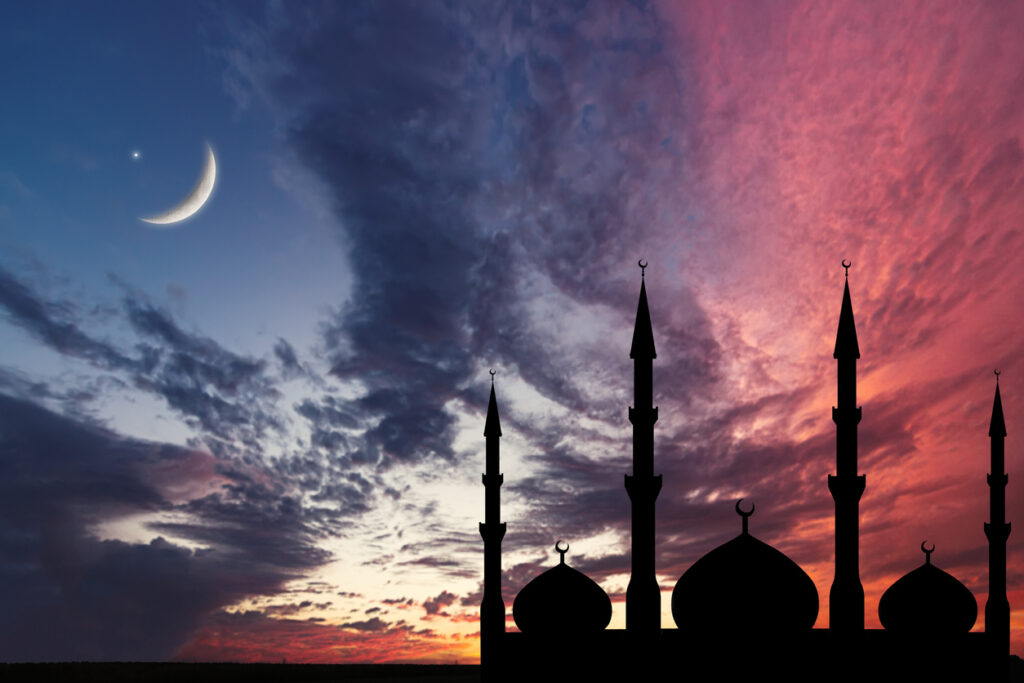Ramadan (ra·muh·dan) is more than just a holy month in the Islamic calendar. It’s a month of introspection and about growing closer to God. During this month, Muslims fast from their desires, develop self-control and reach a greater purpose.
Ramadan is the month where the Quran was revealed to the Prophet Muhammad (peace be upon him), the final Messenger of Islam. It is during this month that Muslims are prescribed fasting – refraining from food, drink, intimacy and ill language during daylight hours (roughly 4am to 8pm).
Fact: Muslims and Jews both use a calendar based on lunar sightings as opposed to solar-based calendar systems. And the calendar begins in the evening for the next day!
As the days are based on moon sightings, the beginning and end of Ramadan are subject to the lunar sightings. The Month will start for most on the 2nd of April, and this means Eid-ul Fitr (the end of fasting) may fall on either the 2nd or 3rd of May depending on your location and the Moon sighting. You can read more about the lunar sighting mechanism here.
Prayer is a time you can clear your mind and refocus throughout the day. Ramadan achieves the same.
What do people do in Ramadan?
Ramadan is most known for refraining from food and drink, yet it is mostly centred around your personal connection with God. Muslims aim to break bad habits and establish more wholesome ways to connect with God.
This could mean giving up backbiting, gossiping and practising more gratitude throughout the day. I try to take up more mindfulness and reflect a lot more on my actions throughout the day.
Think of it like this: prayer is a time you can clear your mind and refocus throughout the day. Ramadan achieves the same, holistically, by taking away distractions and allowing more time to focus on your personal development.
It is also a perfect time to remember how blessed we are to have all we have.
Fact: Did you know that 1 in 10 people in the world live on under $1.90 a day?
This is a great time to give back to the community, by volunteering, using befriending schemes or donating to charity.
Fact: Did you know that smiling is a form of charity in Islam? The Prophet Muhammad (peace be upon him) said, “Smiling in your brother’s face is an act of charity”.
Iftar is when we break our fast. You feel the sense of community during this time when families get together for an evening feast to commemorate their achieved fast.
What does this mean at work?
During Ramadan, Muslims in the UK fast 16+ hours a day, so I look to balance my working day and discuss flexible working arrangements with my team.
Fact: Did you know that Muslims have five daily prayers to make throughout the day and these times change based on the position of the sun?
Especially in winter, up to four of the prayers are during typical working hours.
The timing of prayers can fall during a meeting or a client call, so I may need to ask my team to cover these for me. But personally, to be comfortable in the workplace it’s important that I can speak up and be open about my religious beliefs.
This is especially true during Ramadan when many Muslims adjust their working hours. I try to organise my day so that meetings happen when I’m most alert and energised. Flexible working hours are crucial to balance personal commitments such as fasting and balancing work.
Be brave and have a discussion with your colleagues!
What to consider during this month
As part of your organisations’ commitment to diversity and inclusion, it is important to be brave and ask questions, and be aware of appropriate ways to strike up D&I conversations with colleagues.
Remember that not all Muslims practise their faith in the same way, so please do not assume someone is fasting. It is important to foster a safe space for someone to discuss their personal commitments to their faith by being approachable and understanding.
There are also exemptions to fasting as mentioned directly in the Quran:
‘So whoever sights [the new moon of] the month, let [them] fast; and whoever is ill or on a journey then an equal number of other days. Allah intends for you ease and does not intend for your hardship.’
– Quran chapter 2: verse 185
For those managing teams where a team member may be practising fasting during the month, please check in with your colleagues and see if they would like to adjust their workdays. A useful schedule Muslims tend to use is to start their workday earlier.
Sehri is the morning meal, which happens at the first prayer (Fajr) at dawn and ends at sunset. After sunset, the fast begins! So an earlier work pattern may mean colleagues have more energy during the earlier parts of the day.
Many Muslims also attend the extended night prayers called taraweeh. These are long night prayers every day of Ramadan that aim to cover the whole Quran in recitation.
Be conscious of work/ life balance during this month. Many Muslims aim to complete the recitation of the whole Quran and adopt additional habits and may have a very packed schedule outside work hours. Again – be brave and have a discussion with your colleagues!
How to participate during this month
Fasting is a practice done in many beliefs and cultures. If you feel up to the challenge, you could do the following to learn more about this month:
- Donate to charity. There are many Muslim charities that help feed those in poverty. I normally use Ummah Welfare Trust as it is UK based and 100% of donations go to the cause.
- Fast with a fellow Muslim. Many organisations have started rolling out Fasting Challenges which is something I organised for PwC and now influencing at Accenture. These are amazing ways to launch interfaith dialogues and to bring teams closer together. Check-in with your organisation to see if there are any similar initiatives and get involved.
- Meditate. Muslims pray five times a day, try taking five five minute breaks throughout the day to meditate and clear your mind.
- Give up a bad habit and replace it with a good one. This could be the month to break a bad habit and replace it with a good one. For example, try to smile at every stranger you lock eyes with; say hi to someone new.
The most important thing to remember is to fight your unconscious biases.
If a Muslim is fasting during Ramadan, chances are they have been doing this yearly for a large part of their life. This is a choice by them to fast and something that many Muslims look forward to as a spiritual experience. The best way to make someone included is not to alienate them in their differences, but to be intrigued and encourage a culture of sharing and finding common ground.
Want to know more on Ramadan and workplace inclusion? Read Ramadan at work: HR best practice
[cm_form form_id=’cm_65a14c3f5da64′]






